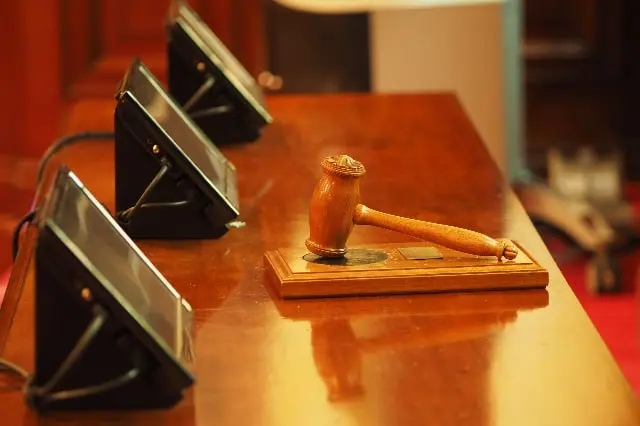Nestled in the heart of Cass County, Missouri, lies the charming small town of Harrisonville. With a population of just over 10,000 residents, this close-knit community is the perfect blend of small-town living and modern conveniences. However, like any other town, Harrisonville is not immune to the challenges that come with substance abuse and drug-related offenses.
In Harrisonville, as in the rest of Missouri, drug possession charges are a serious matter, and the consequences can be life-altering. For individuals facing these charges, it is of paramount importance to seek legal representation from experienced criminal defense attorneys, such as the Benjamin Law Firm, LLC. Our team of skilled lawyers is well-versed in the nuances of Missouri drug laws and can provide the best possible defense.
With our extensive knowledge and confident approach, we offer clear guidance and support for our clients as they navigate the complexities of the legal system. Our goal is to protect their rights, minimize the short and long-term consequences of drug possession charges, and ultimately, help them get their lives back on track. We understand the gravity of these situations and are committed to providing reliable, effective, and compassionate representation for the residents of Harrisonville and the surrounding areas.
Understanding Drug Possession Laws in Harrisonville, MO
In Harrisonville, Missouri, it is essential for us to be aware of the drug possession laws and the consequences that come with violating them. As inhabitants of this city, understanding these rules can help prevent inadvertent legal transgressions, ensuring a better quality of life for everyone.
The drug possession laws in Harrisonville cover a wide range of substances, some of which include:
- Marijuana: Despite its legal status in some states, marijuana remains illegal in Missouri for recreational purposes.
- Controlled Substances: This category encompasses drugs such as cocaine, heroin, methamphetamine, and prescription medications like opioids, which are only legal with a valid prescription.
The penalties for drug possession offenses in Harrisonville depend on several factors, including the type and amount of the drug, as well as any prior convictions. Typically, these offenses can be classified as:
- Misdemeanors: Involving lesser penalties, often consisting of fines and probation.
- Felonies: Carrying more severe consequences, such as imprisonment and lasting damage to one’s record.
For example, possession of small amounts of marijuana (< 35 grams) is considered a misdemeanor and may result in a fine of up to $1,000 and up to one year in jail. In contrast, possession of a controlled substance such as cocaine could be charged as a Class D felony, which carries a potential sentence of up to seven years in prison and a maximum fine of $10,000.
It is worth noting that Missouri has implemented drug courts, which offer an alternative to traditional criminal proceedings. These courts focus on treatment and rehabilitation rather than punishment, providing a more compassionate approach to drug offenders. To participate, individuals must meet specific criteria and demonstrate a genuine commitment to overcoming their addiction.
By remaining informed about the drug possession laws in Harrisonville, we can work together to foster a safer and more law-abiding community for all.

Building a Strong Defense Against Drug Possession Charges
When we are approached by someone facing drug possession charges in Harrisonville, MO, we know how important it is to build a strong defense strategy. We believe that a solid understanding of the local drug possession laws and a well-thought-out plan can make a significant difference in the outcome of such cases. In this section, we will briefly discuss the steps we take in building a strong defense against drug possession charges.
First and foremost, we begin with a thorough case review and evidence analysis. This step is crucial in determining the strength of the prosecution’s case, identifying potential weaknesses, and uncovering opportunities that may enable us to negotiate plea bargains or dismissals of charges. We diligently scrutinize all the documents, police reports, and any available records related to the case.
Next, we conduct extensive legal research on Harrisonville, MO drug possession laws and relevant court decisions. This helps us stay up-to-date with any changes or nuances in the law, and allows us to craft the most effective legal arguments in support of our client’s position. Knowledge of the local laws is indispensable when it comes to identifying possible defenses and either challenging the legality of the arrest, the search, or the handling of the evidence.
At times, it might be necessary for us to consult with an expert witness. This can be particularly helpful in cases involving the alleged possession of illegal substances or the analysis of forensic evidence. Expert witnesses can provide valuable insights and testimony that can further bolster the defense strategy and maintain the integrity of our client’s case.
To summarize, the process of building a strong defense against drug possession charges in Harrisonville, MO, involves a comprehensive case review, meticulous legal research on local drug possession laws, and in some cases, consultation with expert witnesses. When we take on a drug possession case, we make it our priority to provide our clients with the highest possible level of legal representation and support. If you or a loved one is facing drug-related charges in Harrisonville, MO, don’t hesitate to reach out to a confident and knowledgeable Personal Injury Attorney Missouri for assistance.

Key Factors in Drug Possession Cases
In drug possession cases, several key factors come into play that can greatly impact the outcome. Let’s explore some of the most important aspects, such as types of evidence, potential defenses, and legal issues.
Types of Evidence
In drug possession cases, the prosecution typically relies on various forms of evidence to prove their case. Some common types of evidence include:
- Physical evidence: This includes the actual drugs found, as well as any paraphernalia, such as pipes or syringes.
- Witness testimony: Police officers, informants, or other witnesses may be called upon to testify about the circumstances of the arrest and the accused’s actions.
- Lab analysis: For the substance to be considered a controlled substance under the law, it must be positively identified as such through laboratory testing.
Potential Defenses
Those who find themselves charged with drug possession may have several potential defenses available to them:
- Lack of knowledge: The accused may argue that they were unaware that the substance in question was a controlled substance or that it was in their possession.
- Lack of control: To establish possession, the prosecution must prove that the accused had control over the substance. If the accused can show that they did not have control or that someone else had control, this could be a valid defense.
- Unlawful search and seizure: If law enforcement officials violated the accused’s rights by conducting an unlawful search or seizure, the evidence obtained may be inadmissible in court.
When building a defense, it’s important to consult with an experienced defense attorney who can assess the unique circumstances of each case.
Lack of Knowledge or Control Over the Substance
In certain cases, the accused might not have been aware of the presence of the controlled substance or their connection to it. For instance, someone might leave drugs in a shared vehicle without the knowledge of the other party. In such situations, the issue of knowledge and control becomes crucial. However, proving lack of knowledge or control can be challenging, especially if the substance was found in the accused’s personal belongings or in places where they had access.
Unlawful Search and Seizure Issues
The Fourth Amendment to the U.S. Constitution protects individuals from unreasonable searches and seizures by law enforcement. If the police conduct a search or seizure without a valid warrant, consent, or probable cause, any evidence obtained during that search might be deemed inadmissible in court. In drug possession cases, this can be a crucial component of the defense strategy, as successfully arguing that a search was unlawful may lead to the suppression of the physical drug evidence, potentially resulting in the dismissal or reduction of the charges.
In conclusion, understanding the key factors in drug possession cases is essential for both the prosecution and the defense. By examining the types of evidence used, analyzing potential defenses, and considering the legal issues of knowledge, control, and search and seizure, one can be better prepared for what to expect in such cases.

Navigating the Legal Process for Drug Possession
Navigating the legal process for drug possession in Harrisonville, MO can be a daunting task. In this section, we will provide an overview of the legal proceedings, from the arraignment and plea options to trial procedures and possible outcomes.
Overview of Legal Proceedings for Drug Possession Cases in Harrisonville
| Step | Description |
| 1. Arrest & Investigation | Police arrest individuals suspected of drug possession and collect evidence for the prosecutor’s case. |
| 2. Charging | The prosecutor files charges and the court issues an arrest warrant or a summons. |
| 3. Arraignment | The accused appears in court, hears the charges, and enters a plea. |
| 4. Pre-trial Motions | Both sides file motions and engage in negotiations to resolve the case before going to trial. |
| 5. Trial | The case goes to trial if negotiations fail, and a judge or jury determines guilt or innocence. |
Arraignment and Plea Options
At the arraignment, defendants are informed of the charges against them and their plea options, which usually consist of the following:
- Not guilty: This plea allows the defendant to proceed to trial and force the state to prove guilt beyond a reasonable doubt.
- Guilty: The defendant admits guilt and proceeds to sentencing, potentially receiving a lighter sentence for accepting responsibility.
- No contest: The defendant does not admit guilt but concedes that the evidence is sufficient to prove guilt. This plea may be advantageous in civil litigation stemming from the same incident.
Pre-trial Motions and Negotiations
During the pre-trial phase, both the prosecution and defense file numerous motions, such as motions to suppress evidence or dismiss charges. In addition, this phase involves negotiations between the defense and prosecution, which could result in an agreement called a plea bargain. Plea bargains can involve reduced charges or sentencing concessions in exchange for a guilty plea.
Trial Procedures and Possible Outcomes
If the case proceeds to trial, evidence is presented, and witnesses testify. The prosecution must prove their case beyond a reasonable doubt. Possible outcomes include the following:
- Acquittal: If the judge or jury finds the defendant not guilty, they are released, and the case is over.
- Conviction: If the defendant is found guilty, the case proceeds to the sentencing phase. Sentences range from probation, drug treatment programs, fines, or incarceration depending on the severity of the offense and the defendant’s criminal history.
Navigating the legal process for drug possession can be complex, but understanding each step can help alleviate some concerns and uncertainties.

Consequences of Drug Possession Convictions in Harrisonville
Drug possession convictions in Harrisonville, MO can have a significant impact on an individual’s life. In this section, we will discuss the immediate consequences, long-term impacts, and potential rehabilitation and probation options for those convicted of drug possession.
Immediate Consequences Upon conviction, individuals may face the following immediate consequences:
- Fines, which can range from a few hundred dollars to thousands of dollars, depending on the type and quantity of drugs involved
- Potential jail time, which can range from a few days to several years
Long-Term Impacts Beyond the immediate consequences, a drug possession conviction can have long-lasting effects on various aspects of an individual’s life:
- Employment – A criminal record may make it more difficult for the individual to find or maintain employment, due to background checks and potential reluctance from employers to hire someone with a drug-related conviction.
- Education – Students convicted of drug possession may lose eligibility for financial aid, scholarships, or admissions to educational institutions.
- Housing – A criminal record can make it more difficult to secure rental housing or buy a home, as landlords and lending institutions may conduct background checks or have strict policies regarding those with drug-related convictions.
Rehabilitation and Probation Options In certain cases, individuals convicted of drug possession may be eligible for rehabilitation or probation programs. These options can include:
- Drug court or diversion programs – Programs aimed at helping individuals address their drug issues, potentially avoiding jail time while working on recovery and rehabilitation.
- Probation – Supervised release, which may include random drug testing, participation in drug treatment programs, or other conditions and requirements imposed by the court.
It’s important to note that eligibility for these programs varies depending on the individual’s specific situation, previous convictions, and the nature of the drug possession charges. It’s essential to consult with a knowledgeable attorney in Harrisonville, MO to explore these options and navigate the legal process effectively.

Effective Defenses Against Drug Possession Charges
When facing drug possession charges, it’s important to have a strong defense strategy to protect your rights and ensure the best possible outcome in your case. We have compiled a list of common, effective defense strategies that can be utilized by a Highly-Trained Criminal Defense Attorney Kansas City MO, specifically from Benjamin Law Firm, LLC.
- Suppressing illegally obtained evidence: If the evidence against you was obtained illegally, such as through an unlawful search or seizure, we can file a motion to suppress the evidence, which could significantly weaken the prosecution’s case. This is a crucial point of challenge since it holds law enforcement accountable for upholding your rights during the arrest and investigation process.
- Challenging the chain of custody: The chain of custody is the documentation of every step involved in the collection, processing, and storage of the evidence by law enforcement. When there are gaps or inconsistencies in this documentation, we can argue that the evidence may have been tampered with or mishandled, potentially leading to the dismissal of the charges.
- Negotiating plea bargains for reduced charges: Depending on the specific circumstances of your case, we may be able to negotiate a plea bargain with the prosecution. This could result in reduced charges, lighter penalties, or alternative sentencing options, such as drug treatment programs instead of jail time.
It’s important to remember that every case is unique, and developing an effective defense strategy requires a thorough understanding of the specific facts and circumstances surrounding your case. By working with a skilled criminal defense attorney, you’ll have access to the necessary resources and expertise to present the most effective defense possible.
















